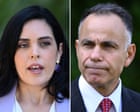
In a world shaped by complexity, the stories surrounding political, personal, and public health developments remind us of the continual ebb and flow of human experiences. Three significant events have emerged on the global stage, each highlighting the resilience and perseverance of individuals and systems navigating their respective challenges.
The first story unfolds in Australia, where John Pesutto, the former Victorian Liberal leader, has successfully resolved a significant financial obligation that had threatened his political career. Pesutto’s payment of $2.3 million in legal costs to his colleague, Moira Deeming, marks the end of a contentious chapter that could have led to his bankruptcy and disqualification from parliament. This payment was made possible through the cooperative support of the Victorian Liberal party, which extended a $1.5 million loan to him. By addressing this burden, Pesutto not only secures his position within the political arena but also exemplifies how collective support and determination can overcome daunting obstacles. The resolution of this financial predicament serves as a testament to the power of collaboration and the importance of community in weathering financial storms.
Across the globe in the United Kingdom, a personal story highlights the human impact of immigration policies. Leighton Allen, a British father, finds himself separated from his family due to stringent UK visa income requirements. Allen’s partner, Sophie Nyenza, and their children remain in Tanzania, underscoring the challenges that working-class individuals face when confronted with procedural barriers to family unity. Allen’s experience speaks to the broader implications of policy decisions on personal lives, as he navigates a system that he perceives as punitive. His narrative is a poignant reminder of the emotional and practical hurdles that can arise when policy and personal circumstances collide. This story invites reflection on how societies can strive to balance policy integrity with compassion and inclusivity to better support families in similar situations.
In the United States, a different form of administrative challenge has emerged within the realm of public health. The first meeting of the newly appointed Advisory Committee on Immunization Practices (ACIP) revealed a landscape of contrasting opinions that have shaped an essential dialogue on vaccine policy. The appointment of eight new members by the US Health Secretary in collaboration with vaccine skeptic Robert F. Kennedy Jr. has brought diverse perspectives to the discussion table. The pivotal meeting was a convergence of debate and dialogue, as members critically examined the questions, conflicts of interest, and future paths for immunization policy. Despite the inherent challenges, this gathering illustrates the complexity and importance of fostering constructive discourse in public health policy. Through open communication and consideration of varying viewpoints, the panel hopes to navigate the intricacies of immunization policy, ultimately striving for decisions that prioritize public well-being.
These stories, while unique in their contexts and characters, collectively highlight the intricate tapestry of modern life. They remind us of the ways in which individuals, institutions, and societies continue to adapt and respond to the multifaceted challenges and opportunities that define our world. As we observe the unfolding of these events, it is essential to maintain a sense of mindfulness and understanding, acknowledging the different layers at play and appreciating the human spirit’s resilience in pursuing solutions and seeking common ground. Through patience and dialogue, these diverse threads of experience weave together a broader narrative of perseverance and possibility.
Source: {link}
